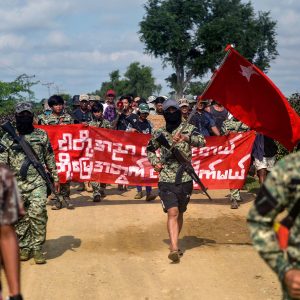The Barbie movie has dominated the movie industry with record breaking successes: it stands as the highest-grossing film of 2023 worldwide, highest-earning live-action movie directed by a female worldwide, and the 15th biggest movie of all time—truly capturing the kenergy it promised. But the Barbie movie has become much more than a successful film. Barbie provides surprising insight on the international political sphere as a microcosm of the Chinese tensions between Hong Kong and Taiwan. Barbieland and China approach foreign policy in strikingly similar ways: both impress an idealized image onto territories, censor contradictory opinions, and strive for a homogenous culture.
During the blowout dance party sequence in Barbie, Stereotypical Barbie receives backlash for revealing her irrepressible thoughts of death. The room goes completely silent until she takes back her statement and reaffirms her loyalty to an untouchable perfect world where death is furthest from any Barbie’s mind—one where they’re all supposed to simply dance, dance the night away. Hong Kong is also expected to dance, dance the night away. Through the National Security Law implemented in June 2020, the Chinese Communist Party (CCP) banned all criticism of Chinese legislation within Hong Kong. The law criminalized secession, subversion, terrorism, and collusion with external forces. Lawmakers insisted on the ambiguity of this legislation, making it fairly easy to prosecute someone for nearly any action, thereby legalizing and even encouraging censorship. The placement of the National Security Law not only limits language use, it also allows the CCP to spread false information to convince the public of artificial truths. Similarly, the Barbies have no choice but to accept the reality that Barbieland has made the real world a more gender inclusive, feminist and equal place. Once Stereotypical Barbie leaves Barbieland, she realizes the ideas imposed upon her in Barbieland were false and simply supported the Barbie mainland’s agenda.
Barbieland is given an image of how they are supposed to perceive the world and is scrutinized for thinking anything different, comparable to the CCP’s usage of censorship and promotion of their idealized image of “One China.” Any information that doesn’t stem from the mainland’s overarching ideals is omitted from large news sources in an effort to truly convince constituents of the benefits China promises under their power.
China’s authoritative influence isn’t limited to Hong Kong. Next January, Taiwanese individuals vote in their presidential election, deciding whether they should vote for candidates that foster closer ties to China or those who maintain a policy of deterrence against looming Chinese invasion. As the election nears, China’s disinformation reign rages throughout Taiwan’s news sources. The United Daily News, a historically entrusted news source consumed by the majority of Taiwan, reported that the US and Taiwan were collaborating to create bioweapons. This original report transformed into the wider conspiracy that Taiwan was going to collect blood samples of citizens and provide them to the United States government.
Taiwanese officials believe this is Chinese disinformation hard at work, striking another vulnerable area of Taiwan right before the election happens. Pinning the Taiwanese may be an effective tactic. The lack of awareness concerning foreign involvement in Taiwanese media sources points to China’s disinformation successes: a survey by Doublethink lab reported less than 20% of respondents believed the false information spread in Taiwan during elections came from abroad, opening up concerns about Taiwan’s susceptibility to exploitation from China.
Currently, Taiwan is governed independently of China’s rule. China, nevertheless, considers Taiwan as a portion of China. The 1992 Consensus established that there exists exclusively one China, but both nations interpret the meaning of one China differently. China understands the 1992 Consensus as an acknowledgement that “two sides of the strait belong to one China and would work together to seek national reunification.” Taiwan understands the Consensus as “one China, different interpretations.” At the time, this agreement in China’s eyes was intended to mediate the gradual reunification of Taiwan and China as one entity. The crisis today couldn’t have proven this expectation more wrong. China’s influence in the respective territories has only weakened the relationship between mainland China and the semi-autonomous states. China has threatened Hong Kong and Taiwan’s natural entitlement to basic human rights, promised autonomy, and seemingly established liberties in an effort to unify the territories into a perfect “One China” world.
The upcoming Taiwanese election directly parallels that of Barbieland. When Barbie‘s Kens begin to spread the ideas of a supposedly more ideal patriarchal world to the inhabitants of Barbieland, they establish an election to evaluate whether Barbieland should concede their powers to the leaders of Kendom. Each of the Kens work to brainwash the Barbies into falsely thinking this world is better—a disinformation campaign intended to exploit the Barbies.
Barbieland also embraces its designation as a utopian world, desperately trying to maintain an idyllic lifestyle in every area possible. Barbies are expected to glorify every moment in their world, consistently asserting the idea that it’s “the best day ever. So was yesterday, and so is tomorrow, and everyday now until forever.” The Barbies follow a meticulous daily routine intended to cement a false sense of security in the current political climate. However, if a Barbie steps out of place at any point, they are immediately reprimanded.
Taiwan is subject to a similar attempt at authoritarian influence. China recently released its own version of ChatGPT, an ERNIE bot, that further perpetuates a single idealized Chinese image that has to be universally accepted by Taiwan. When the chatbot was asked about Taiwan’s legitimacy as an independent entity, the chatbot retorted “it is the sacred duty of all Chinese people, including Taiwan compatriots, to complete the great cause of reunifying the motherland.” The chatbot asserts that China can’t “give up the use of force” to ensure reunification and China “reserves the option to take all necessary measures.” As more Taiwanese use the chatbot, Taiwan has the potential to be as brainwashed as Barbieland. The chatbot reinforces Taiwan as an inseparable component of China where everyone has to put on a facade, trying to keep the party running without one hair out of place.
The Barbie movie has resonated across fields that its producers never envisioned, going as far as predicting power politics and the infringement of basic rights. As Barbie teaches us, however, human rights aren’t just dolls foreign leaders can play with.
Featured Image Source: LA Times






Comments are closed.